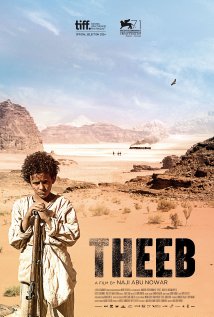Monday June 01, 2015
Movie Review: Theeb (2015)
WARNING: SPOILERS
“Theeb” (“wolf” in Arabic) is a rare beast: an art film that is also a harrowing adventure story. You think its joys will be in the small details, in how tactile it feels, and in the fact that it’s about a Bedouin boy named Theeb learning the ways of men in the Arabian peninsula in 1916. One assumes slice-of-life, episodic and educational. Then you’re on the edge of your seat. The movie contains foreshadowing even though it all comes as a surprise. There’s an assuredness in every frame even though it’s writer-director Naji Abu Nowar’s first feature.
We start in voiceover, with life advice that mixes the idealistic and the realistic:
In questions of brotherhood
Never refuse a guest
Be the right hand of the right
When men make their standAnd if the wolves offer friendship
Do not count on success
They will not stand beside you
When you are facing death
These words echo as the movie plays out. We know Theeb means wolf, but we know Theeb isn't the wolf. So who is?
Is that Lawrence?
 Theeb (Jacir Eid Al-Hwietat, extremely effective in his first role) has a mass of curly black hair atop an adorable face that is often furrowed with curiosity and concentration. When we first see him he’s being schooled by his older brother, Hussein (Hussein Salameh Al-Sweilhiyeen, Eid’s cousin), on how to shoot a rifle, and later, when two strangers come to their father’s home, on how to slit the throat of a lamb. The strangers are an Arabian guide named Marji (Marji Audeh), and a British officer, who is blonde, bearded and taciturn (Jack Fox). For a time we wonder: Is this Lawrence? Are we getting the Arabian side of the “Lawrence of Arabia” story?
Theeb (Jacir Eid Al-Hwietat, extremely effective in his first role) has a mass of curly black hair atop an adorable face that is often furrowed with curiosity and concentration. When we first see him he’s being schooled by his older brother, Hussein (Hussein Salameh Al-Sweilhiyeen, Eid’s cousin), on how to shoot a rifle, and later, when two strangers come to their father’s home, on how to slit the throat of a lamb. The strangers are an Arabian guide named Marji (Marji Audeh), and a British officer, who is blonde, bearded and taciturn (Jack Fox). For a time we wonder: Is this Lawrence? Are we getting the Arabian side of the “Lawrence of Arabia” story?
Our view is Theeb’s view, which is the child’s-eye view. He knows things are happening but not why. He knows Hussein is to lead the two men to the “Roman Well” but nothing beyond that. He tags along anyway. The men are a day’s journey out before they realize the boy has followed them.
There are subtle tensions. The Brit, Edward (for Thomas Edward Lawrence?), gets angry when Theeb plays with a small box he’s carrying, and the three men are constantly looking for thieves and enemies. But which enemies? What’s the mission? And seriously, is that Lawrence?
We relax slightly when we get to the Roman Well—a hole in the ground surrounded by rock and sand. “Where are they?” Edward wonders, as he pulls up the well bucket. “They’re coming,” his guide says. But he’s wrong. Edward drinks, then starts back. The water is red with blood. The men they were to meet are at the bottom of the well. In a second, everything is charged. “We’re being watched,” Marji says.
“Lawrence of Arabia” wasn’t the only movie on my mind as I watched this one. I wondered whether Theeb would be like Zushio in Kenji Mizoguchi’s “Sansho Dayu”: the privileged son who falls from grace into the harsh realm of men. I thought of “Bonnie and Clyde” and “Shane”: movies where violent sounds, particularly gunfire, explode off the screen. Here, it’s the lamb’s bleat as Hussein cuts its throat; it’s the gunshot that tears through Edward’s chest as he’s drinking from a bota bag. Guess he’s not T.E. Lawrence after all.
Even then we don’t even know who the enemy is. Germans? Ottoman officials? Thieves? But we keep calculating. With Edward and Marji shot, how will they get back? If their camels are stolen, how will they get back? The lowest point is after Hussein is shot and Theeb runs and falls into the well. Even if he escapes, what then? He’s a small boy in the middle of the desert in violent times; and as we hear several times in the film: the strong eat the weak.
Is that home?
“Theeb” deserves to be seen, and it deserves to be seen in a theater. Cinematographer Wolfgang Thaler (Ulrich Seidl’s “Paradise” movies) makes the desert a force in the film. One shot of the night sky makes you mourn for the loss of all of your city stars.
It’s a movie that’s not just about the loss of life; it’s about the loss of a way of life. Hussein is a pilgrim guide—taking worshippers through the desert to Mecca. But he’s being replaced by the “iron donkey,” the railway that cuts through the desert. So even if Theeb gets back, what is back? What is home to a Bedouin? What is the point of a pilgrim guide in a world of the iron donkey?
Baseball's Active Leaders, 2023
What Trump Said When About COVID
Recent Reviews
Everything Everywhere All at Once (2022)
Black Panther: Wakanda Forever (2022)
Doctor Strange in the Multiverse of Madness (2022)
Spider-Man: No Way Home (2021)
The Cagneys
A Midsummer Night's Dream (1935)
Something to Sing About (1937)
Angels with Dirty Faces (1938)
A Lion Is In the Streets (1953)
Man of a Thousand Faces (1957)
Never Steal Anything Small (1959)
Shake Hands With the Devil (1959)







